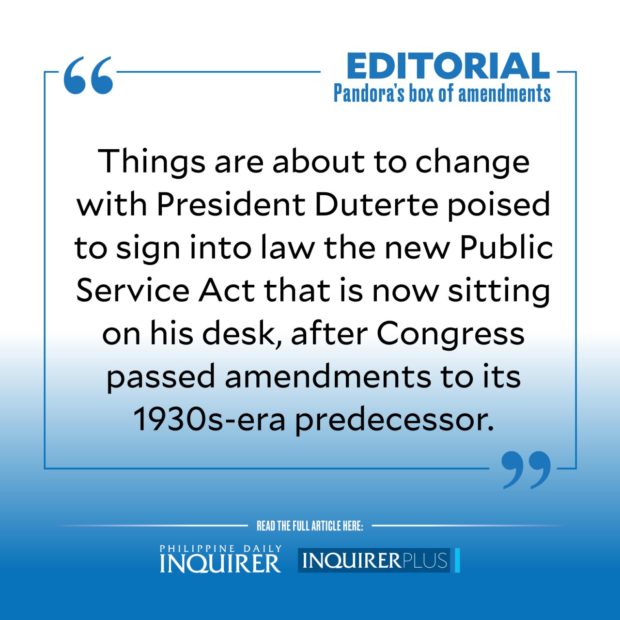Pandora’s box of amendments
Arguments in favor of amending the economic provisions of the 1987 Constitution, ostensibly to encourage greater foreign investments in the country, have been around since the 1990s, not very long after the country’s basic law was ratified.
And efforts to modify some restrictive provisions, especially those that limited foreign ownership in local firms to 40 percent, have failed repeatedly due to the public’s fears — well-founded, to some degree — that those involved would take advantage of the exercise to sneak in the lifting of term limits so coveted by some national and local politicians.
But things are about to change with President Duterte poised to sign into law the new Public Service Act that is now sitting on his desk after Congress passed amendments to its 1930s-era predecessor.
As far as the Constitution goes, nothing has changed. Foreigners are still prohibited from owning more than 40 percent of any firm that is classified as a public utility.
But, as is often said — “where there’s a will, there’s a way” — even if the way takes one through a back route to arrive at the desired destination.
What the Senate and the House of Representatives did was to simply amend the definition of a “public utility” to exclude companies involved in telecommunications, domestic shipping, railways and subways, airlines, expressways and tollways, and airports.
Once Mr. Duterte signs that measure into law, firms involved in these businesses cease to become public utilities and instead become “public services.” As such, they can now be 100-percent owned by foreigners.
The distribution and transmission of electricity, petroleum and petroleum products pipeline transmission systems, water pipeline distribution systems, and wastewater pipeline systems, including sewerage pipeline systems, seaports, and public utility vehicles remain classified as public utilities and, as such, will retain their 40-percent foreign ownership limits.
Proponents of the measure argue that opening up these particular sectors to more foreign capital will introduce greater competition in the local market that will result in greater efficiency, better services, and lower prices for Filipino consumers. At the same time, the additional capital from overseas will also result in job creation that is much needed in this country, especially after the COVID-19 pandemic ravaged the economy.
Whether the end goal is to truly benefit the Filipino people as its proponents claim or if it is meant to favor some specific companies in dire need of foreign capital is merely a matter of speculation and is difficult to conclude at this point. It could work. Or it could turn into an economic disaster.
To be sure, the solution is elegant in the way it avoids the more contentious process of formally amending the Constitution. But it is also scary in the way previously rock-solid provisions of the country’s basic law can so easily be circumvented by smart political maneuvering.
We’re not arguing for the staid provisions of the 1987 Constitution to be kept static as they were set three and a half decades ago. The Philippines and the rest of the world have changed substantially since then and the economic provisions of the basic law need updating.
What we are calling for, however, is awareness on the part of the citizenry that a Pandora’s box may have been opened — well meaning as it may be, though we can’t conclusively say for sure at this point — in an effort to make the charter more responsive to current realities.
More importantly, we are calling for greater vigilance among Filipinos, going forward.
With this new method of getting around constitutional prohibitions — some have argued that it is a de facto amendment—the possibility that similar means of “moving the goal posts” (if one cannot change the game) cannot be discounted.
If this new way of simply amending laws to, in effect, amend long-established provisions of the Constitution becomes common practice, the next changes our politicians might do may not be so innocuous.





















